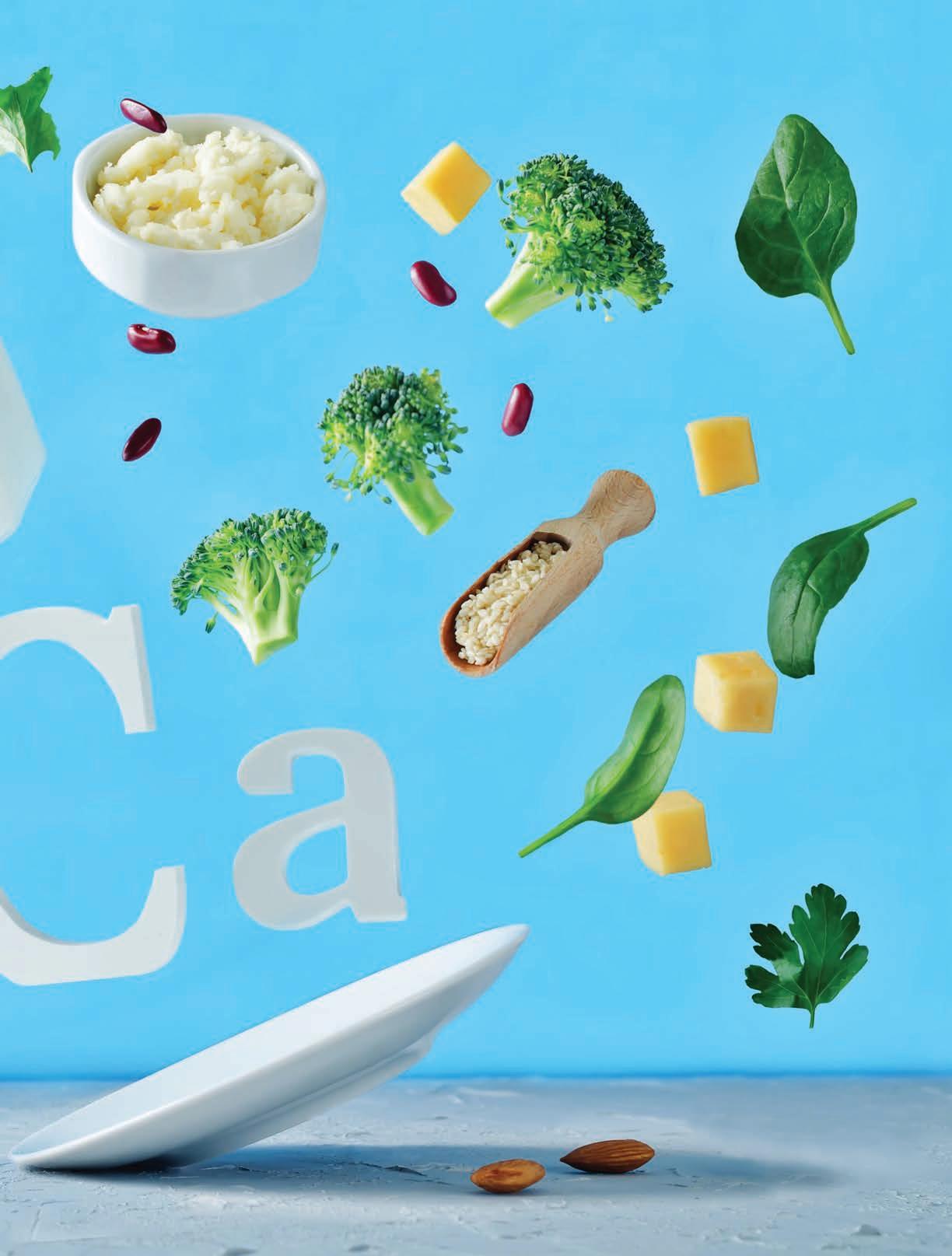
6 minute read
Can You Take Too Much Calcium?
Calcium is essential for strong bones—that’s a fact. But does this mean you need high doses of calcium supplements? Will your bones crumble if you don’t? Here’s what science has to say. BY VERA TWEED
After the FDA authorized a health claim in 1993—that calcium in foods and supplements may reduce the risk for osteoporosis—calcium became a widely marketed item. But government nutritional surveys show that most Americans still consume less than the recommended amount from food and supplements: 1,000 mg daily for adults, and 1,200 mg daily for women after age 50 and for men after age 70.
Advertisement
About three out of every four women who are over age 60—and nearly as many teenage girls—fall short of optimum intake of calcium, as do about half of boys and men in the same age groups. And there are slightly smaller but significant shortfalls among all other age groups.
So are you deficient? The answer isn’t as simple as saying, “take so many milligrams a day and you’ll be okay.” Just as a shortfall is bad for your health, so is taking too much. An excess of calcium supplements can increase risk for heart disease, kidney stones, and possibly colon cancer. The amount of calcium in your food, some health conditions, and some medications can all influence your calcium levels.
When it comes to calcium supplements, individual needs really do vary. In fact, scientists who analyzed decades of calcium research concluded that, “the proper dosages of calcium supplementation for people are actually not clear.”
Calcium and Bone Health
In the human body, 99 percent of calcium is found in bones and teeth. The remaining 1 percent is in the blood, where it’s essential for many functions including contraction and relaxation of blood vessels, muscle function, transmission of signals through nerves and other tissues, and hormone secretion. If there isn’t enough calcium in the blood, additional calcium will be released from bones.
At the same time, bone continually turns over, breaking down and rebuilding. In later life, especially in women after menopause, the breakdown is greater than the formation of new bone, and this leads to bone loss, fragile bones, and higher risk of fractures.
Adequate calcium from food and supplements helps to preserve bone in

older people, but there is conflicting evidence about whether calcium supplements prevent fractures. Other successful strategies to preserve bone and reduce fracture risk include taking vitamin D with calcium and getting regular exercise, such as walking or running and resistance exercises.
Calcium and Heart Disease
In studies, the link between calcium and heart disease is not clear. In some studies of older women, calcium has appeared to lower risk for heart disease, but in others, supplementing with at least 1,000 mg daily increased risk. Men taking more than 1,000 mg of calcium in supplements also had higher risk for heart disease. However, lower-dose supplementation did not seem to contribute to heart disease.
In studies of calcium and blood pressure, the results are also inconsistent. In some cases, higher calcium intake reduced blood pressure but in others, it had no effect. Dairy products have been found to lower blood pressure, but it isn’t clear if the beneficial effect came from calcium.
While the calcium-heart relationship isn’t clear, the American Society for Preventive Cardiology and the National Osteoporosis Foundation have concluded that calcium is safe as long as your daily total from food and supplements doesn’t exceed 2,500 mg for adults up to age 50, and 2,000 mg after that.
Calcium and Cancer
Some studies have linked calcium with less colon cancer, especially a daily amount of 700–800 mg from food and/or supplements. However, in a study of women who took 1,200 mg of calcium daily for at least 3 years, with or without 1,000 IU daily of vitamin D, there was an increased risk of polyps that are precursors of colon cancer.
In studies of men, an increased risk for prostate cancer was seen among those taking 1,300 mg of calcium daily or more. But there was no link between prostate cancer and lower daily intakes of calcium, between 500 and 1,000 mg from food and supplements.
Why Calcium Levels Can Be Too Low or Too High
While it’s essential to get adequate dietary calcium, other factors, such as medications or parathyroid disorders, can raise or lower calcium in the blood to unhealthy levels.
Not to be confused with the thyroid, there are four parathyroid glands in the neck, each the size of a grain of rice. They regulate levels of calcium in the blood by secreting parathyroid hormone to raise calcium levels and stopping release of the hormone to lower levels.
If you routinely take any medications, ask your pharmacist if they influence the way your body uses, stores, or excretes calcium. And find out if calcium supplements are recommended.
These are some common reasons for unhealthy levels of calcium:
Calcium levels can be too low because of: Calcium levels can be too high because of:
Low levels of albumin, a protein in the blood
Underactive parathyroid glands (hypoparathyroidism) Low levels of vitamin D or magnesium High levels of phosphorus An inflamed pancreas Overactive parathyroid glands (hyperparathyroidism) Cancer
An overactive thyroid (hyperthyroidism) Too much vitamin D
Sarcoidosis
Tuberculosis

❱ Being immobilized for a long time
Calcium Tests
Levels of blood calcium can be tested during a medical check-up. In addition to identifying your personal calcium needs, a test may help to detect hidden medical conditions.
Another study, which looked at nutrition and death rates, found an association between high-dose calcium supplements and increased cancer deaths. If you tracked 1,000 people for a year, the study found that cancer deaths of 1.5 individuals would be associated with taking 1,000 or more milligrams daily of calcium in supplements, compared to taking none. While researchers observed this association, they did not conclude that calcium supplements caused those 1.5 deaths.
Calcium and Kidney Stones
One study of postmenopausal women found that taking 1,000 mg of calcium and 400 IU of vitamin D for 7 years increased risk for kidney stones by 17 percent, but another study found fewer kidney stones among women who took calcium supplements or ate more calcium-rich foods. Lack of fluids and eating a lot of foods high in oxalates— such as spinach, bran flakes, rhubarb, beets, potato chips, French fries, nuts, and nut butters—can also increase risk for kidney stones.
What to Do
First, aim to eat foods that are naturally rich in calcium, which don’t pose health risks. Milk and other dairy products can provide 200–300 mg in a serving. An 8-ounce serving of collard greens, broccoli rabe, or kale, or a 3-ounce serving of canned sardines with bones, can deliver a similar amount.
Fortified foods, such as many cereals, plant milks, and juices, contain added calcium. Consuming these is essentially like taking calcium supplements with food. These are valid sources, as are traditional calcium supplements in pills.
To determine your own need for calcium supplements, check the calcium content of the foods you eat and add up your usual daily total. If you take antacids that contain calcium, a multivitamin, or other supplements, calculate your average calcium intake from these and add it to your food sources to get a daily total. If it’s less than the daily recommended 1,000 mg (or 1,200 for women over 50 and men over 70), fortified foods or calcium supplements can make up the deficit.










